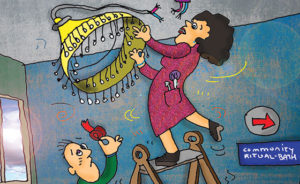ONE OF MY most respected teachers frequently intoned, “If you can say ‘Yes,’ say ‘Yes. But if you cannot say ‘yes,’ you are obligated to say ‘No.’” This lesson has profoundly altered my life.
In the years prior to the aforementioned epiphany, I’d been crazed with a desire to be liked, valued and emulated. Frequently saying “Yes” to strangers, I consequently assumed burdens that would impact relationships with those closest to me. Among my more dramatic and public ‘Yes Projects’ were installing a chandelier in the waiting room of our community ritual-bath (no, I’m not a licensed electrician), taking the 86-year-old aunt of a co-worker to an elder-friendly dentist, scouting-out disability-suitable housing for a woman in synagogue and garbing many-daughters of dysfunctional parents who were struggling to keep their children out of foster care. These chesed projects were, at times, all-consuming but helped convince me that G-d was reserving a front-row seat for me in Heaven.
Do the staccato plaints of a husband/mother/father/son/daughter merit the same air-time as public benevolence? It became painfully apparent to me in later years that nurturing a family requires vigilance and, in fact, the precious familial relationships we inherit over time are created with wisdom in order to provide hands-on training for interacting with those on the outside. Kindness to strangers but disdain for those closest to us, is not the spiritual order of social-behavior. We are given families to practice on; not to hurt our own while saving our more appealing public personas for the outside. It is an uncomfortable-for-me observation that altruism can teeter upon the slippery slope of self-righteousness if not occasionally revisited.
Much of Israeli society relies on the kindness of strangers and, with the exception of our now-famous hi-tech industry, the hefty lion’s share of the GNP is tied to non-profit philanthropy. And until a year ago, every job I held in the Jewish State involved raising funds to help the indigent and disabled of Eretz Yisroel.
I have dear friends and acquaintances who continue this holy work day-in and day-out and I stand in awe of their steadfast dedication. Many house gifts that I both receive and give have cards and/or stamps denoting the name of the benevolent organization that received support from the sale of some beautifully wrapped candy dish or fragrant soap. I’ve yet to encounter a coffee-shop, lingerie boutique or nail salon where the payment counter is not crowded with ‘kupot tzedaka’ for one’s loose change. The question of whether or not one volunteers in Israel is moot; where or for whom one volunteers is always the question.
But still . . . . .
There is something very empowering about not racing out to pack food cartons for the destitute when a husband has had a demeaning experience at work and needs to talk. Or sit with a glass of scotch and say nothing. Or, from the corner of his eye, observe you tackle a basket of random socks to find him a matching pair or three. A child who was rejected from the choir, or didn’t make the cut for Science Club will hardly find solace in knowing that mommy is manning an annual blood-drive or collecting blankets for lone-soldiers. A child in pain might prefer to heal with a trip with mom to the shuk or a bicycle ride around the walls of the Old City.
Tzedaka does not mean “charity.” The root of the word means ‘right,’ and by not involving oneself in the act of repairing the world through ‘righteousness,’ he is simply wrong. And to paraphrase a well-worn axiom, “Tzedaka begins at home . . . .”
New York native Andrea Simantov has lived in Jerusalem since 1995. She is a contributing write to Jlife magazine










